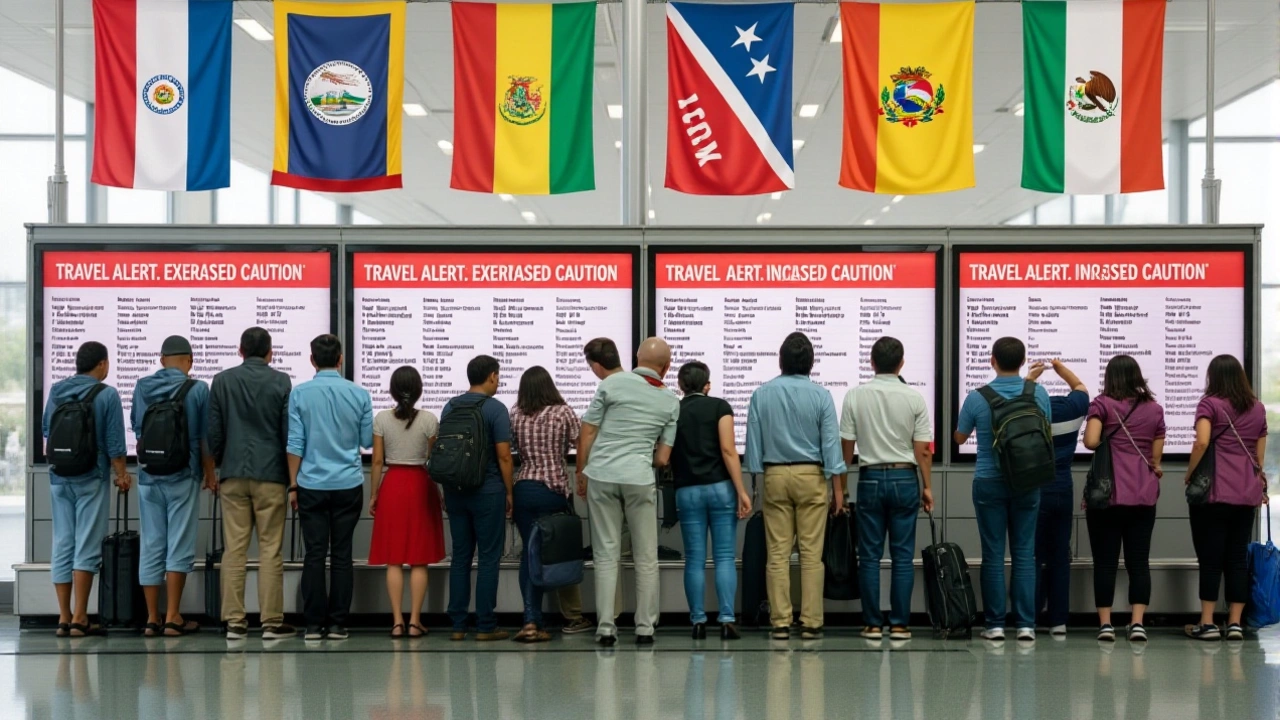When Global Affairs Canada updated its travel advisories on November 2, 2025, it didn’t just tweak a warning—it reshaped how thousands of Canadian travelers, from business executives to weekend explorers, plan their trips south. Brazil, long a top destination for Canadian tourists, was bumped to "Exercise a high degree of caution," joining a growing list of countries including Paraguay, Mexico, Colombia, Bolivia, Costa Rica, and even France under what officials are calling the "Summer-Winter Blend 2025" travel alert. The move isn’t about tourism decline—it’s about survival. And for Canadians, the stakes are personal.
Why Brazil? It’s Not Just Crime—It’s Control
The official reason? A "sharp rise in organised-crime activity" along Brazil’s 17,000-kilometre land border. But behind that bureaucratic phrase lies a much more complex reality. Since mid-2025, Brasília has deployed hundreds of Federal Police and army units into the Amazon and the so-called "triple-frontier" region where Brazil, Argentina, and Paraguay meet. This isn’t a reaction to a single incident—it’s a response to years of escalating drug trafficking, human smuggling, and arms trafficking that have turned remote border towns into de facto no-go zones. Canadian consular data shows visa processing times for Brazilians entering Canada have doubled since July 2025, now averaging 35 calendar days. But here’s the twist: Brazil also reinstated its reciprocity-based visa requirement for Canadians in April 2025, ending the unilateral waiver that had been in place since 2019. It’s not Canada acting unilaterally. It’s a tit-for-tat, security-first recalibration.Paraguay’s Quiet Surge to the Top of the Alert List
Most Canadians didn’t see Paraguay coming. For years, it was the quiet neighbor—cheap, safe, overlooked. But on November 13, 2025, at 3:08 p.m. Ottawa time, Global Affairs Canada quietly updated its advisory for Paraguay to "Exercise a high degree of caution." Why? Because Paraguay’s porous borders with Brazil and Argentina have become critical transit corridors for criminal networks. The same patrols beefing up in the Brazilian Amazon are now being mirrored on the Paraguayan side. Local sources in Ciudad del Este report that border checkpoints, once casual, now require passport scans, biometric checks, and sometimes even vehicle undercarriage inspections. One Canadian expat living in Asunción told me: "I used to drive to Foz do Iguaçu on a whim. Now I need three days’ notice, a notarized letter, and a prayer."What This Means for Business Travelers
For companies sending employees to São Paulo, Rio de Janeiro, or even Bogotá, the changes are operational nightmares. Mobility managers report that HR departments are now requiring: confirmed return tickets, proof of accommodation (not just hotel bookings—bank statements showing funds), and even background-check documentation from local authorities. Some firms have stopped routing executives through secondary land crossings entirely. "We used to fly into Asunción and drive to Foz," said a logistics director at a Toronto-based mining firm. "Now we charter direct flights. It’s 30% more expensive, but it’s the only way to guarantee arrival without a six-hour wait at a checkpoint.
The Ripple Effect: From Colombia to Peru
The alert isn’t isolated. Colombia remains under "Exercise a high degree of caution," with U.S. government employees barred from certain regions due to kidnapping and armed conflict risks. Peru, as of November 19, 2025, carries a similar advisory with regional caveats. Even Costa Rica, once seen as a stable haven, is now flagged for rising petty crime in tourist zones and delays at San José’s airport due to new customs protocols. The pattern? It’s not random. It’s a coordinated tightening. South American nations, responding to transnational crime and pressure from international partners, are raising their security bars—and Canada is simply documenting the new normal.What Travelers Need to Do Now
If you’re planning a trip to any of these countries before the end of 2025, here’s what you can’t afford to skip:- Apply for visas at least six weeks in advance—35 days is the average, but delays are common.
- Carry printed copies of return flights, hotel confirmations, and proof of funds.
- Avoid land crossings between Brazil, Paraguay, and Argentina unless absolutely necessary.
- Register with the Global Affairs Canada Travel Registry.
- Check Travel.gc.ca daily—updates come without notice, often with timestamps accurate to the minute.
And don’t assume your travel insurance covers you. Many policies exclude areas under "Exercise a high degree of caution." Read the fine print—or risk being stranded.

What’s Next?
Canadian officials are quietly monitoring whether Argentina and Chile will follow suit. Both nations have tightened their own border controls this year, and if the trend continues, the entire Southern Cone could soon be under the same advisory tier. Meanwhile, Brazil’s government has signaled it may extend its visa reciprocity policy to other nations, including Australia and Japan, by early 2026. That could mean even longer wait times for Canadian travelers—and more friction at every checkpoint.Frequently Asked Questions
Why is Paraguay now on Canada’s travel alert list when it’s not usually considered dangerous?
Paraguay’s inclusion stems from its role as a transit hub for organized crime networks operating along Brazil’s 17,000-km border. While Paraguay itself has low violent crime rates, its remote border regions with Brazil and Argentina have become critical corridors for drug trafficking and smuggling. Canadian officials cite increased patrols and checkpoint delays near Ciudad del Este as evidence of systemic security risks that affect travelers crossing into or through the country.
Does the travel advisory mean I can’t go to Brazil or Paraguay?
No—it means you must exercise increased caution. The advisory doesn’t ban travel, but it signals that risks are elevated. Canadian consular services may be limited in remote areas, and border delays are common. Travelers are strongly advised to avoid secondary land crossings, carry extra documentation, and register with Global Affairs Canada’s Travel Registry for emergency support.
How long will these advisories last?
There’s no set end date. Canada updates advisories based on real-time security assessments, not calendars. Brazil’s visa policy and border patrols are tied to internal security reforms that may take years to stabilize. The Summer-Winter Blend 2025 alert could persist into 2026 or longer, especially if crime rates remain high or neighboring countries tighten controls further.
Are Canadian citizens being targeted specifically?
Not intentionally—but Canadian travelers are more visible. Many are affluent, carry smartphones and expensive gear, and often travel without local contacts. Criminal groups don’t target nationalities, but border officers are now trained to flag travelers from countries with high visa waiver rates, like Canada, for extra screening. It’s not discrimination—it’s risk-based profiling.
Can I still get an eTA for Brazil if I’m Canadian?
No—Brazil no longer accepts eTAs from Canadian citizens. Since April 2025, Canada’s reciprocity-based visa waiver ended, and Brazilians now require a full visa to enter Canada, so Canada reciprocated. Canadians must apply for a traditional visa through Brazilian consulates, which now take an average of 35 days to process. The eTA system only applies to certain countries eligible for visa-free entry to Canada, not the reverse.
What’s the difference between "Exercise a high degree of caution" and "Avoid non-essential travel"?
"Exercise a high degree of caution" means risks are elevated but manageable with preparation—like longer waits, stricter checks, and possible delays. "Avoid non-essential travel" signals active threats: armed conflict, kidnapping, or widespread violence. Canada has not raised Brazil or Paraguay to that level yet—but if crime spikes or a Canadian citizen is harmed, the upgrade could happen within days.

Written by Lucan Silvers
View all posts by: Lucan Silvers